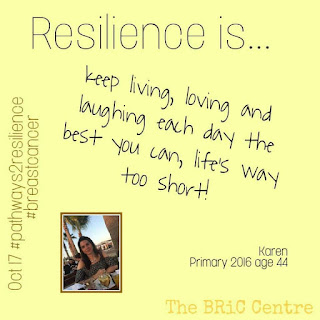In our weekly discussion, we shared our feelings about losing peers and
our friends as a result of breast cancer.
Hearing about the death of
another woman with breast cancer can tear apart the hearts of those of us who
have been diagnosed with primary and secondary breast cancer. We find ourselves
mourning women in the public eye, women we have never met, like Rebecca
Ellison, Connie Johnson and Mao Kobayashi – to name but a few.
Why, we asked ourselves, do
we feel such intense pain for women who we have never met?
It is because they are
untimely. It is because we have seen too many young, vibrant women robbed of
their lives. It is because some, but not all, are mothers, leaving behind
children, sometimes very young children. It is because we know how much the
loss of these unique, extraordinary women will hurt their loved ones and their
families.
Grief for friends with
breast cancer can feel more validated, but our response to the loss of women we
have known through online groups and forums is often no less intense and the
strength of our reaction can take us by surprise. Our discussion highlighted
that losing someone who means something to us and shares our own
vulnerabilities, can feel uniquely devastating. We are profoundly sorry for
their loss but, importantly, it makes us fearful, reminding us of the
vulnerability that we face, reminding us of what may be awaiting us and our own
mortality, reminding us of our powerlessness and lack of control. We feel
guilty that we are one of the lucky ones, that we have survived. We feel
grateful and profoundly thankful. We also wonder why it is we are still here.
Time seems to stop. We cannot find the words to describe our complicated
feelings and so we remain silent. Our pain is invisible and unseen.
For some of us, anger is
our first reaction, anger at a cruel disease which seems to senselessly rob us
of a life long before our expected time. Others described intense sadness. Some
are reminded of other losses they have experienced and the pain they felt and
still feel, while others described sensing those losses that are yet to come.
Women with secondary breast cancer shared just how hard it can be for them
because of the looming, anticipatory fear that accompanies each loss, causing
them intense anguish as they try to banish the dreadful thought ‘it could be me
next.’
What can we do in these
circumstances?
As humans, we naturally try
to avoid suffering but Naz explained that research shows that acknowledging
loss and spending time on mourning and grieving can, in fact, help us to adapt
more quickly. In comparison, blocking out the pain, and attempting to push it
out of our minds can cause us even more suffering. There is no prescription for
how long we need to grieve or how intense the sadness, usually we find our own
path and, deep inside us, we know.
Our attitudes to grief and
loss are deeply embedded in our culture. As a society we are ill-equipped to
deal with death, believing that immortality lies beyond the horizon of new
medical innovation and technology, or if that can’t save us, then a positive
attitude can. We heard from women from other cultures how helpful it can be to
be able to express grief openly and dramatically. Western culture, however,
does not give us a strong role model for death and grief, it's a
hidden-away-thing, rituals are few and the emphasis is on ‘being positive’ and
‘being strong.’ Yet, when we focus our energy on being strong, we can forget to
give ourselves permission to cry.
It can be comforting to
know we have held the person who has died in our love and in our hearts.
Memories become like gold, allowing us to celebrate the lives of our beloved
and we know that we can carry this love forwards with us in our hearts.
Gestures help, such as lighting candles and sharing happy memories because they
allow us to share our grief as a group, reminding us that we are not alone.
Most importantly, we can listen. Really listen, and by listening, we can open
our hearts to one another. If we can be brave and we can allow ourselves to
feel our pain, we can become like the sea, 'the Living Infinite,' nothing but
"love and emotion".
#ResilienceDiscussion













































































